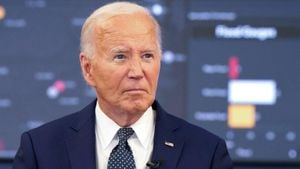Donald Trump’s recent nomination of Tulsi Gabbard as the Director of National Intelligence (DNI) has ignited fierce debates across the political spectrum, prompting widespread concern from national security experts and raising questions about her suitability for the role.
The ex-Hawaii congresswoman, who gained attention during her bid for the presidency in 2020, is known for her controversial foreign policy views, especially her stances on U.S. military interventions and her meetings with figures such as Syrian President Bashar al-Assad. Several critics argue her appointment could significantly impact the direction of U.S. intelligence policy.
John Bolton, former national security adviser under Trump, didn’t hold back his criticism. He asserted during a CNN interview, "She’s not capable of doing it. Her judgment is nonexistent, and the idea of her being put in charge of this function should give our adversaries in Moscow and Beijing a lot of relief." He emphasized Gabbard's lack of experience within the intelligence community as detrimental to the role, stating, "She has zero experience dealing with the intelligence community." Bolton also previously suggested there should be an FBI investigation before any confirmation processes since Gabbard has been accused of promoting narratives aligned with Moscow.
Should Gabbard be confirmed, she will oversee the U.S. intelligence agencies, including the CIA, and hold the pivotal responsibility of compiling the President's Daily Brief. This briefing is key for the president's decision-making on national security. Gabbard's critics have highlighted their worries about her ability to separate her personal opinions from her official responsibilities. The DNI role is typically characterized by its need for impartiality and expertise, and many are questioning whether Gabbard's vocal opinions on U.S. foreign policy align with these expectations.
According to U.S. Naval War College professor Tom Nichols, Gabbard’s appointment poses potential security risks, stating, "A person with Gabbard's views should not be allowed anywhere near the crown jewels of American intelligence." He echoes concern over her past remarks about Putin, likening them to sentiments dangerously misplaced.
Some supporters, meanwhile, defend Gabbard, arguing her military background—and her vocal opposition to what she characterizes as unnecessary military interventions—provides her with valuable insights. They suggest her nomination may bring necessary reforms to the intelligence sector.
The political ramifications of her nomination may also filter down to tangible operational changes within U.S. intelligence agencies. Critics express alarm not only at the potential politicization of intelligence under her watch but also fear she may selectively manage information to fit the administration’s narrative. This could undermine the objectivity required of the intelligence community, which has been historically revered for its analysis and reporting based on factual accounts rather than political agendas.
Trump's selection of Gabbard marks another chapter of his administration's reliance on unconventional candidates who align with his methodologies, often shaking traditional political and military establishments. Reflecting on Gabbard’s nomination, Bolton predicted potential contention within the Senate, predicting, "I think there will be enough Republicans—maybe not a majority, but enough—to block the nomination. And if not, we're in deep trouble."
Despite the mounting criticism, Gabbard has yet to formally respond to these allegations and critiques, nurturing hope among her supporters for her confirmation. Her supporters point to her military service and foreign policy critiques of U.S. involvement as evidence of her capability to bring change to intelligence operations.
During her tenure, it will be Gabbard’s responsibility to manage relations among the 18 U.S. intelligence agencies, ensuring proper communication and coordination, a task aimed at improving national security strategy. The DNI, established post-9/11, was meant to facilitate seamless cooperation among agencies to prevent intelligence failures. With Gabbard at the helm, the ability to maintain this coordination amid controversial views on global involvement remains uncertain.
During interviews, Gabbard has critiqued the established foreign policies, advocating for less militaristic solutions to international dilemmas and expressing skepticism toward America's involvement abroad. Some suggest her worldview may appeal to those seeking reform, but others fear it reflects ideologies inconsistent with U.S. interests and security.
Gabbard's supporters argue her candidacy inspires a much-needed dialogue about U.S. interventionism, possibly igniting discussions on the role of military action versus diplomatic solutions to conflict. Yet, the potential upheaval within the DNI could shape not only intelligence outcomes but more broadly influence U.S. foreign policy under her guidance, should she be confirmed.
Recent discussions surrounding Gabbard’s nomination also tap on underlying issues of polarization within American politics, particularly concerning national security strategies. Observers suggest her appointment, if it goes through, could intensify divisions among lawmakers, reflecting broader partisan discord over defense and security strategies. The outcome of her confirmation hearings will undoubtedly set precedents on how future candidates are vetted for such pivotal roles.
Caroline Kennedy, the outgoing U.S. ambassador to Australia, advised the public to withhold judgment as the Senate deliberates on Gabbard's nomination. Speaking at the National Press Club, she stated, "Just calm down and wait and see what happens"—a sentiment intended to defuse immediate fears about the nomination and its potential impacts.
Gabbard’s next moves will be closely watched, not only by her critics but also by supporters and international observers alike. The world is waiting to see how this former military officer transforms the intelligence community's discourse and whether her actions reflect the policies she has championed throughout her political career.



